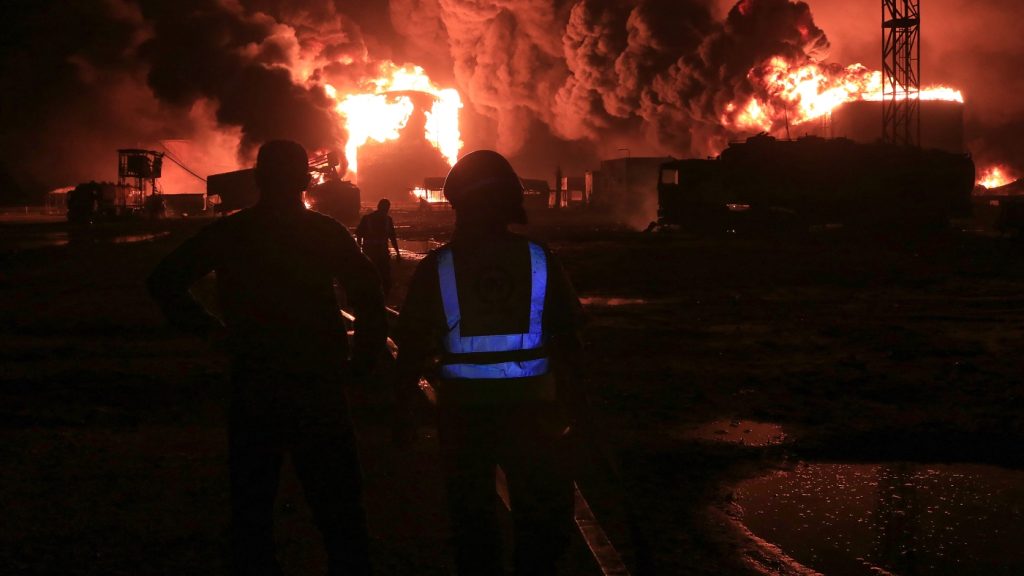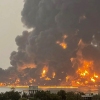Israeli airstrikes sparked a massive fire at an oil storage facility in Yemen’s Red Sea port of Hodeidah on Saturday. Israel said the attack was in retaliation for a drone attack by Houthi militias that killed an Israeli man in Tel Aviv on Friday.
AFP via Getty Images/AFP
Hide caption
Toggle caption
AFP via Getty Images/AFP
Israel said on Sunday it had carried out retaliatory airstrikes on Yemen’s main port to stop Iran from continuing to supply weapons to the Houthi militia.
Israeli bombing on Saturday night sparked a massive fire in oil and gas storage tanks in the port of Hodeidah on Yemen’s Red Sea coast. Israeli and Yemeni officials said Israel also targeted a power plant and cranes that load and unload cargo at the port.
Israeli Prime Minister Benjamin Netanyahu said the port of Hodeida was “a gateway for weapons supplied by Iran to its Houthi terrorist proxies, who have used these weapons to attack Israel, Arab countries in the region and many other countries.”
The Israeli attack came a day after the Houthis attacked Israel with a large drone on Friday morning, killing one man in an apartment near Tel Aviv’s waterfront.
Netanyahu described the Israeli operation in Yemen as a “direct response” to the drone attack on Tel Aviv.
The port of Hodeidah is also vital for importing food and other civilian goods into the impoverished country. The full extent of the damage was not immediately clear but large fires along the coast and plumes of black smoke suggested the damage was significant.
Yemen’s Health Ministry said three people were killed and more than 80 were injured, many with severe burns.
Houthi spokesman On social media The spokesman described the Israeli attack as an attack on a civilian object, saying it would “only strengthen the resolve of the Yemeni people” to support the Palestinians, whom he called “the most just cause on earth.”
Meanwhile, Israel said the Houthis fired a missile at southern Israel on Sunday morning, but that its air defenses shot it down before it reached Israeli airspace.
Long-range operations
By reaching the port of Hodeidah, the Israeli plane had traveled more than 1,000 miles, which Israeli military spokesman Daniel Hagari called “one of the longest flights ever conducted by the Israeli Air Force.”
Israeli media reported that the air force used American-made F-15 and F-35 fighter jets in the operation.
U.S. Secretary of Defense Lloyd Austin met with Israeli Defense Minister Yoav Gallant after the Israeli attack and issued a statement saying the Pentagon “reaffirms the United States’ firm commitment to Israel’s security and Israel’s right to self-defense.”
Also in Washington, a National Security Council official, speaking on condition of anonymity, said the United States was in ongoing contact with Israel but was not coordinating or supporting operations in Yemen.
Israel says the Houthis have fired more than 200 missiles and drones at Israel in recent months. Israeli air defenses and U.S. naval forces in the Red Sea have shot them down in almost every case before they reached Israeli airspace.
The Houthis have also shelled merchant ships in the Red Sea in what they say is an act of solidarity with the Palestinians, and the U.S. Navy and allies have been thwarting attacks in the Suez Canal, a vital shipping lane for large container ships traveling between Asia, the Middle East, Europe and Africa.



